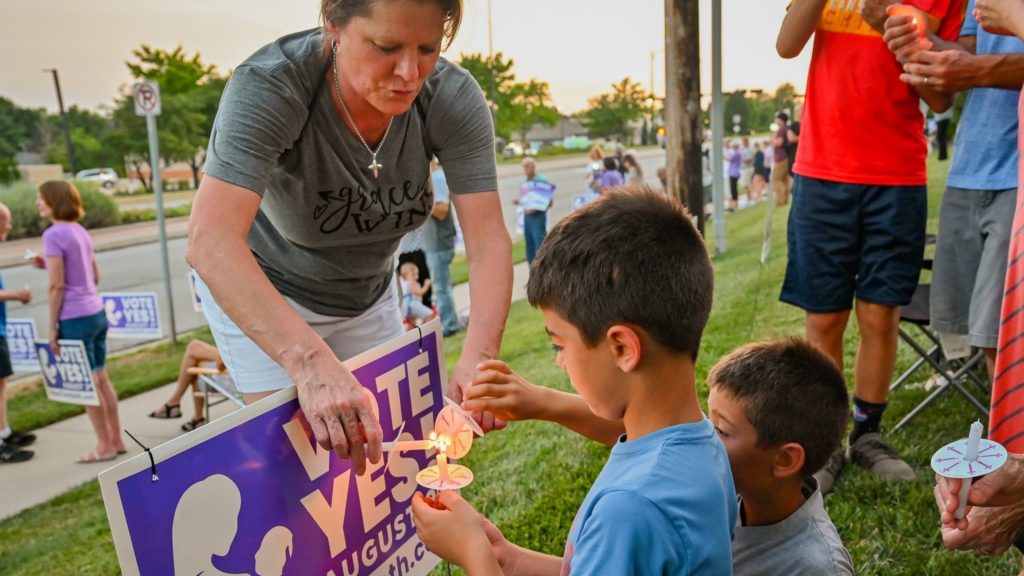In separate rulings, the Kansas Supreme Court July 5 overturned a ban on a second-trimester surgical abortion procedure known as dilation and evacuation, or D&E, and struck down a series of abortion clinic regulations long opposed by abortion providers.
The state's high court found that in both instances the laws violated a section of the Kansas Constitution, which guarantees equal rights.
The decision in the abortion procedure case was 5-1, with one of the seven justices, Justice Keynen "K.J." Wall, not participating. It leaves in place a lower court order blocking the law, which was passed in 2015.
But before it took effect, the Center for Reproductive Rights filed suit against the 2015 law on behalf of two physicians in Kansas who said they had safely performed D&E procedures for decades and argued the ban violated a woman's right to an abortion protected by the Bill of Rights in the Kansas Constitution.
Writing for the majority, Justice Eric S. Rosen said the constitution's Bill of Rights "includes a pregnant person's right to terminate a pregnancy."
Also known as the Kansas Unborn Child Protection from Dismemberment Abortion Act, Kansas Senate Bill 95 was passed by the Kansas Legislature in 2015 and signed into law by Republican Gov. Sam Brownback on April 7, 2015. Under the law, the D&E procedure, described by pro-life advocates as "dismemberment," was allowed when necessary to protect the life or health of the mother. It was the nation's first ban on the procedure.
Ahead of signing the bill into law, Brownback, a Catholic, called the second-trimester procedure "a graphic reminder about how horrific abortion is. There are actually abortions performed in the U.S. today where you actually dismember an unborn child to pull it out."
Justice Caleb Stegall, a Brownback appointee, said in his dissent July 5, "It is noteworthy that the majority cannot bring itself to acknowledge the government's compelling interest in unborn human life." He also noted that "pregnant women have been quietly -- decisively -- evicted from this court's abortion jurisprudence. Replaced, it would seem, with genderless 'pregnant person(s)' and 'pregnant patients.'"
The Kansas high court's other ruling had to do with Brownback-era regulations on abortion clinics first passed by the Legislature in 2011 governing staffing, procedures, equipment and the physical environment. A lawsuit challenging the regulations was filed the same year.
For example, the regulations required medication abortions to be physically administered by a physician in the same room as a patient, as opposed to administering the medication to a patient via telemedicine. They established a minimum recovery time for patients and outlined inspection requirements for clinics that critics said went beyond that expected of other health care facilities.
With respect to those regulations, Kansas failed to show it had a "compelling interest in protecting maternal health and regulating the medical profession as it relates to maternal health," Justice Melissa Taylor Stanbridge wrote for the majority in the 5-1 opinion striking down the 2011 clinic rules. Stegall was the lone dissenter and Wall did not participate.
In a statement provided to OSV News July 10, Lucrecia Nold, policy specialist at the Kansas Catholic Conference, said, “The ruling was expected, but nonetheless disappointing. The abortion industry and their insidious march of death in Kansas and elsewhere is an attack on our culture, with child-bearing women in its crosshairs.”
“We will persevere with help for pregnancy resource centers and other educational and legislative efforts,” Nold added. The state Catholic conference is the public policy arm of the state’s bishops.
"Adding insult to injury, extremely liberal judges of the Kansas Supreme Court have now overturned basic health and safety standards for abortion facilities," Danielle Underwood, Kansans for Life spokeswoman, said in a July 5 statement. "It hurts to say, 'We told you so,' to the many Kansans who were misled by the abortion industry's assurances that it would still be 'heavily regulated' in our state if voters rejected the 2022 amendment."
Voters in Kansas in 2022 rejected a ballot measure that would have stripped existing protections for abortion from the state's constitution. It was the first ballot referendum on the issue following the U.S. Supreme Court's Dobbs v. Jackson Women's Health Organization decision that year that overturned prior rulings by the high court making abortion access a constitutional right.
After the Dobbs decision, Catholic leaders in the United States reiterated the church's concern for both mother and child, and called to strengthen streams of financial aid or other practical support addressing the factors that can push women toward having an abortion.
New abortion laws took effect in Kansas July 1. The Legislature April 30 overrode four vetoed bills, but one of them is being challenged in court: a measure requiring health care providers to ask women to anonymously report their primary reason for seeking an abortion to compile the data for the state health agency.

